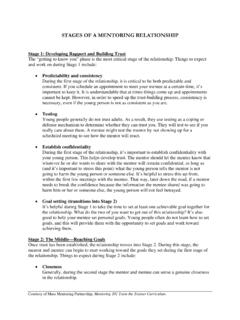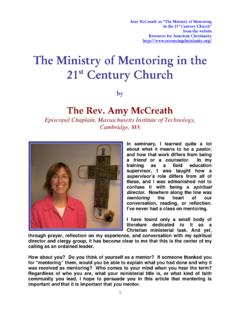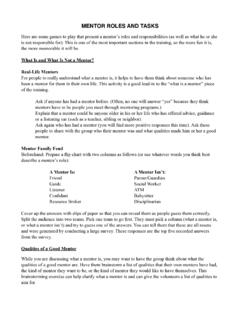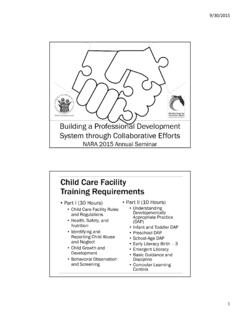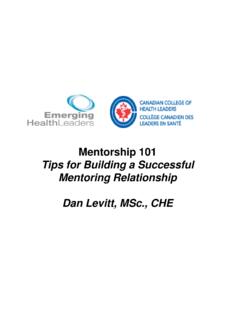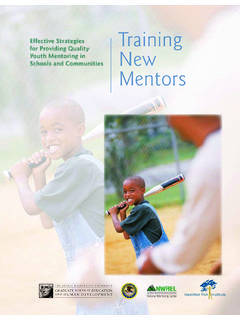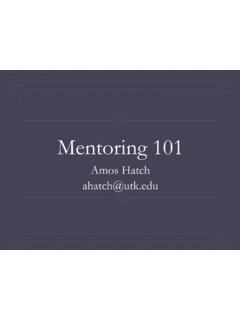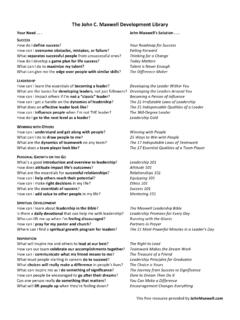Transcription of Mentoring 101: How to Find a Mentor How to Be a Mentor
1 Mentoring 101: How to find a Mentor How to Be a Mentor Lori Pollock University of Delaware March 2015 A Mentor ? Homer: wise and trusted counselor Mentoring = professional + personal relationship A Mentor = someone who takes a special interest in helping another person develop into a successful professional. QUIZ: TRUE or FALSE is no such thing as an ideal Mentor . depends on Mentor & mentee research advisor is a Mentor role model is a Mentor academic advisor is a Mentor department chair is always a Mentor are in good hands if you have one good Mentor .
2 8. Thank goodness, there is a well established Mentoring plan that will work for all students. Research on Mentoring Research shows that those who are mentored achieve greater career advancement and higher work satisfaction than those who are not mentored. Who s Most at Risk? Students People working in jobs considered atypical for their gender First generational professionals .. and others You can be a Mentor at various levels As an undergraduate As a graduate student As a faculty member As a professional In formal Mentoring programs Question Formulation Time 4 Rules: groups of 4.
3 One person as notetaker. a group, write as many questions as you can. not stop to answer, judge, or discuss questions down every question exactly as it is stated. every statement that is made into a question. The Topic: Mentoring in Academia Prioritize Your Questions (5 minutes) your top highest priority questions to be answered with respect to: Being a Mentor in academia 2. For each, be ready to justify. Report Out & Discussion Most Important Questions on Being a Mentor in Academia Giving and Receiving Mentor Mentee Attention Confidence, security Regular contact Listening Advice from experience Decision making Information Knowledge and skills Encouragement Self confidence Opportunities Professional reputation Prioritize Your Questions (5 minutes) your top highest priority questions to be answered with respect to: Being a Mentee in academia 2.
4 For each, be ready to justify. Report Out & Discussion Most Important Questions on Being a Mentee in Academia Build a TEAM of mentors with varying expertise/experience Be sure to thank your Mentors Recommended Reading National Academy of Sciences National Academy of Engineering Institute of Medicine National Academy Press Washington, 1997 More Information for Your Reading Pleasure Benefits of being Mentored + Knowledge of your discipline s expectations + Solid foundation of skills and knowledge in your discipline + Self confidence + Independent problem solving skills + A good start on a professional reputation + Access to a professional network Benefits of being a Mentor + Facilitate another s accomplishments.
5 Parenthood + Most likely to recruit/retain good students + Stay at the forefront of discipline + Continually hone own Mentoring skills + Increase confidence + Strengthen your own network + Give back Everybody is ignorant, only on different subjects. Woodrow Wilson Imposter Syndrome At various times in your life, you can benefit from Mentors As an undergraduate As a graduate student As a faculty member As a professional Formal Mentoring programs How to find Mentors? -In your department at your institution -Outside your department at your institution -In your field outside your institution - Outside your field outside your institution Look Everywhere Consider Your Who are they?
6 Why do you consider them a Mentor ? High School College Graduate School advice on courses, career, personal challenges Contacts/connections for networking, information letters of reference, Encouragement Opportunities (advocates) Coaching Help: how to use your strengths; overcome your weaknesses A role model A listening ear Powerful/probing questions ALL possibilities, w/o judgment A Good Mentor provides: Interested in you Supportive Patient Knowledgeable Competent Accessible Respectful of privacy Empathetic Honest Compassionate A Good Mentor is: Be a Mentor Get What do you have to offer to others?
7 What ways can you start small in Mentoring ? Start by building a relationship. Learn by doing. Mentoring the Individual + Get to Know the Person - background: context - goals: long term/ short term - strengths - weaknesses + Assess the Individual - knowledge - skills - experience Build trust Express commitment Set expectations ( , # times to meet/month) Set limits Create goals (in writing) Every Mentoring relationship has phases, Meet frequently What did you want (need) to know then? In a New Mentor Relationship Mentoring Undergraduates What would you do?
8 Attention: Advice: Information: Encouragement: Opportunities: Mentoring Undergraduates Attention: Semesterly meetings, office hours, rec letters Advice: Discuss course alternatives, outside classroom activities Information: map through requirements, career choices Encouragement: Praise successes Opportunities: Research, grad school, award nominations, TAs Mentoring Graduate Students Attention: Weekly research meetings, individual progress and goal-making, annual review Advice: Course selection, professional skill building activities, time manage.
9 Information: Requirements, career choices Encouragement: Praise successes, challenge Opportunities: Conferences, reviewing, teaching,, Mentoring , internships, service, funding Mentoring Junior Faculty Attention: Available for short chats/quick advise, Work together on proposals and research Advice: Time management, pre-tenure focus of activities, teaching methodology, life balance Information: Department and university policies and traditions, criteria for promotion, history of department/student issues, grant proposal writing strategies, resource people Encouragement: Praise successes, relate own experiences Opportunities: Program committees, service, funding agency contacts and programs Barriers to GOOD Mentoring .
10 Faculty member doesn t have enough time Being too busy is not acceptable Faculty member and student in competition with each other Faculty member and student lack personal experience with people of different backgrounds Trust is not there different agenda Communication problems - listening Unrealistic expectations Barriers to GOOD Mentoring : What NOT to Do as Mentor Be Inflexible. (treat all the same) Abuse your authority. (students doing your work) Be overbearing. (dictating choices) Do, don t overdo. (too close) Clone yourself.




